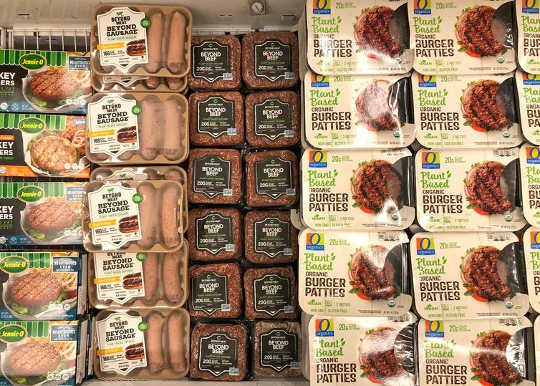
Plant-based alternative foods have grown in popularity, but it’s important to read the labels to know if they’re healthy. (Shutterstock)
Many people are making changes to their diets to eat healthier or in a more environmentally friendly manner. They might choose to eat less meat, less sugar or even adopt an entirely vegan diet. A growing number, however, are choosing a plant-based diet that focuses on foods that come from plants, but may still include animal products, such as meat or cheese.
American biochemist Thomas Colin Campbell coined the term “plant-based” in the 1980s to better explain his research on diet and nutrition. The term surged in popularity in 2016 when Campbell’s book The China Study was reprinted and alternative meat products such as Beyond Burger and Impossible Burger were launched.
Since then, plant-based foods have taken the world by storm. They are everywhere: fast-food chains, restaurant menus, grocery stores, social media, food blogs and on your plate. The global plant-based food market is predicted to reach a market valuation of US$38.4 billion by 2025. In the United States alone, the number of plant-based products available increased 29 per cent between 2017 and 2019.
As a research assistant at the Centre for Culinary Innovation, I work with industry to develop new food products. Although the work of the centre is not limited to plant-based foods, our team focuses on researching, understanding, experimenting and creating new ones.
Get The Latest By Email
The rapid growth of plant-based food is due to several factors. The most common reasons people in Europe, the U.S. and Canada give for eating plant-based food are the health benefits, curiosity to try new food, environmental concerns and animal welfare.
If you are thinking about switching to a plant-based diet, here are six things you should know about plant-based food.
1. Understand what plant-based means
According to the Plant Based Foods Association, a plant-based product consists of ingredients derived from plants, including vegetables, fruits, whole grains, nuts, seeds or legumes.
The final product directly replaces an animal product. By this definition, a cheese made from plant sources can be called plant-based, but flour or bread cannot. If the final product only partially replaces an animal product, then it should be labelled as a blend.

Grocery stores are carrying an increasing number of plant-based protein substitutes. (Shutterstock)
2. A plant-based diet may not be vegan or vegetarian
The terms vegan and plant-based have long been used interchangeably. But following a plant-based diet does not necessarily mean that you are vegan or vegetarian. It means that you are consciously choosing to eat more from plants, but you may still be eating meat, fish, eggs or other animal products.
In fact, plant-based food manufacturers are not targeting vegans and vegetarians since they are only a small percentage of the population. Their main targets are meat eaters and flexitarians — people who eat mostly plant-based diets, but still eat meat.
3. Plant-based food is not a synonym for healthy
Usually, a diet containing a higher proportion of plant-based food is automatically associated with being healthy. However, it might not always be the case.
A plant-based diet is healthy when it is mainly composed of whole foods such as vegetables, fruits, legumes and nuts. In fact, such a diet has been shown to decrease the risk of chronic diseases like heart disease, diabetes and cancer.
Nutritionists remain concerned about heavily processed meat substitutes that contain high levels of saturated fats and sodium. These ingredients — preservatives, flavouring and fillers — enhance the taste, shelf life and texture.
Although they are considered natural, they are not necessary for a healthy diet. They may be environmentally friendly, but they may not be healthy, especially in large amounts.
4. Plant-based food is changing the way we eat
Plant-based food is not going away anytime soon. In fact, what we are seeing now is a global increase of plant-based products.
What started with soy milk in the 1990s, and continued with almond milk in the 2000s and burgers in 2010s, has expanded to different types of plant-based products: pork, chicken, yogurt, ice cream, seafood, fish, eggs, cheese, sausage, jerky and more.

Plant-based egg alternatives have been developed to appeal to people who like the look and mouthfeel of scrambled eggs. (Shutterstock)
While Gen X and baby boomers may be more resistant to change their diets, millennials and Gen Z — who are more likely to consider the food source, animal welfare issues and environmental impacts when making their purchasing decisions — are embracing plant-based food and will continue to do so.
Millennials did not invent this type of eating, but they are re-inventing it and spurring a broader change in attitudes and consumption of plant-based food. Gen Z is growing up with plant-based eating as a norm.
5. Plant-based food is as ‘good’ as its ingredients
What goes unnoticed by many consumers is how these products are made. Replacing animal food products is not an easy task, quite the opposite, it is a very complex one.
It takes years to research and develop plant-based food products. And it has only been possible because of the ingredients available, such as plant proteins, oils, flavourings and binders. The better they are, the better the final product will be. Not only in the sense of texture, appearance, flavour and mouthfeel, but also health.
The next wave of plant-based products will likely be healthier as better ingredients and processes (like 3D printing) will be available. If we look at Beyond Burger, for example, the new formulation is healthier than the previous one.
This 3D printer can produce about six kilograms of plant-based steak per hour.
6. Plant-based is good for the planet, but be careful
One of the main reasons consumers switch to a plant-based diet is because of sustainability and environmental concerns. Indeed, eating plant-based reduces the impacts of climate change, saves water and minimizes agricultural land use.
But be aware that many plant-based brands are a part of a larger operation. A specific brand may be sustainable and environment friendly, but the company that owns it may not be.
It is important that food companies be transparent. Consumers have the right to know where the products they buy come from and how they are made so they can make informed decisions and hold companies and brands accountable.
About the Author
Mariana Lamas, Research assistant, Centre for Culinary Innovation, Northern Alberta Institute of Technology
This article is republished from The Conversation under a Creative Commons license. Read the original article.
books_nutrition







